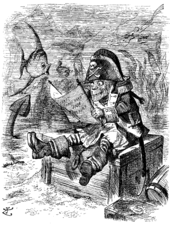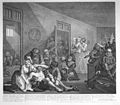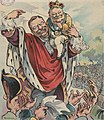Portal:Cartoon
The Cartoon Portal

A cartoon is a type of visual art that is typically drawn, frequently animated, in an unrealistic or semi-realistic style. The specific meaning has evolved, but the modern usage usually refers to either: an image or series of images intended for satire, caricature, or humor; or a motion picture that relies on a sequence of illustrations for its animation. Someone who creates cartoons in the first sense is called a cartoonist, and in the second sense they are usually called an animator.
The concept originated in the Middle Ages, and first described a preparatory drawing for a piece of art, such as a painting, fresco, tapestry, or stained glass window. In the 19th century, beginning in Punch magazine in 1843, cartoon came to refer – ironically at first – to humorous artworks in magazines and newspapers. Then it also was used for political cartoons and comic strips. When the medium developed, in the early 20th century, it began to refer to animated films that resembled print cartoons. (Full article...)

In print media, a cartoon is a drawing or series of drawings, usually humorous in intent. This usage dates from 1843, when Punch magazine applied the term to satirical drawings in its pages,[1] particularly sketches by John Leech.[2] The first of these parodied the preparatory cartoons for grand historical frescoes in the then-new Palace of Westminster in London.[3]

Selected article -
Avatar: The Last Airbender is an American animated television series that aired for three seasons on Nickelodeon from 2005 to 2008. The series was created and produced by Michael Dante DiMartino and Bryan Konietzko, who served as executive producers along with Aaron Ehasz. Avatar is set in an Asian-influenced world of Chinese martial arts and elemental manipulation. The series follows the adventures of the main protagonist Aang and his friends, who must save the world by defeating the evil Fire Lord and ending the destructive war with the Fire Nation. Avatar: The Last Airbender was popular with both audiences and critics, Avatar has been nominated for and won awards from the Annual Annie Awards, the Genesis Awards, the primetime Emmy awards and a Peabody Award among others. In other media, the series has spawned a live-action movie trilogy, the first titled The Last Airbender, directed by M. Night Shyamalan, scaled action figures, a trading card game, second, and third seasons, stuffed animals distributed by Paramount Parks, and two LEGO sets.
Selected character -
Homer Simpson is a fictional main character in the animated television series The Simpsons. Homer is the boorish father of the Simpson family and as the family's provider, he works at the Springfield Nuclear Power Plant. With his wife, Marge, he has three children: Bart, Lisa, and Maggie. Homer embodies several American working class stereotypes: he is crude, overweight, incompetent, clumsy, lazy and ignorant; however, he is also fiercely devoted to his family. Homer was created and designed by cartoonist Matt Groening. He is voiced by Dan Castellaneta and first appeared on television, along with the rest of his family, in The Tracey Ullman Show short "Good Night" on April 19, 1987. After appearing on The Tracey Ullman Show for three years, the Simpson family got their own series on Fox, which debuted December 17, 1989. Homer is one of the most influential fictional characters on television and has inspired an entire line of merchandise. His catchphrase, the annoyed grunt "d'oh!", has been included in several dictionaries. Castellaneta has won four Primetime Emmy Awards for Outstanding Voice-Over Performance and a special achievement Annie Award for voicing Homer.
Did you know... -
- ...that 1999's Scooby-Doo! Mystery of the Fun Park Phantom was the first commercial Scooby-Doo computer game for the Windows platform?
- ...that Czechoslovak communist censors banned publishing of the comic album Muriel a andělé?
- ...that Uri-On, created by Michael Netzer in 1987, was the first Israeli superhero to be published in color?
- ...that Banya: The Explosive Delivery Man is a Korean action comic that combines the styles of Mad Max, Dune and The Lord of the Rings?
Selected list -
There have been 131 episodes of Ed, Edd n Eddy, an animated comedy television series created by Danny Antonucci and produced by Canada-based a.k.a. Cartoon. The series debuted on Cartoon Network in the United States on January 4, 1999, and ended on November 8, 2009, with the premiere of the series finale film Ed, Edd n Eddy's Big Picture Show. The series was originally planned to air for four seasons; however, Cartoon Network ordered two additional seasons and three holiday-themed specials as a result of its popularity. Reruns continue to air on Cartoon Network, including airing as part of the revived block Cartoon Planet. The series revolves around three adolescent boys collectively known as "the Eds", who live in a suburban cul-de-sac. Unofficially led by Eddy, the Eds constantly try to scam the fellow cul-de-sac children in order to purchase jawbreakers. The Eds' plans usually fail and leave them in various predicaments. The award-winning series garnered generally positive reviews, and remains the longest running original Cartoon Network series and Canadian-made animated series to date.
General images -
Selected biography -
Dan Castellaneta (born October 29, 1957) is an American film, theatre and television actor, comedian, voice artist, singer and television writer. Noted for his long-running role as Homer Simpson on the animated television series The Simpsons, he also voices many other characters on The Simpsons, including Abraham "Grampa" Simpson, Barney Gumble, Krusty the Clown, Groundskeeper Willie, Mayor Quimby and Hans Moleman. Born in the Chicago suburb of Oak Park, Illinois, Castellaneta started taking acting classes at a young age. He would listen to his father's comedy records and do impressions of the artists. He was cast in The Tracey Ullman Show, which debuted in 1987. The Tracey Ullman Show included a series of animated shorts about a dysfunctional family. Voices were needed for the shorts, so the producers decided to ask Castellaneta to voice Homer. His voice for the character started out as a loose impression of Walter Matthau, but later evolved into a more robust voice. The shorts would eventually be spun off into The Simpsons. Castellaneta has won four Primetime Emmy Awards for Outstanding Voice-Over Performance for his work on the show as well as an Annie Award for Outstanding Individual Achievement in the Field of Animation in 1993.
Subcategories
WikiProjects
- Main projects
- Arts • Animation • Comics • Entertainment • Visual arts
- Related Projects
- Anime and manga • Biography • Film • Fictional characters • Media franchises • Music • Television • Video games
Selected quote -
Topics
- Comic book
- Comic strip
- Digital comics
- Graphic novel
- Mobile comic
- Motion comics
- Trade paperback
- Webcomic
- Animator
- Animation director
- Animation studios
- Animation film festivals
- Feature-length films
- Short films
- Television series
- Computer-animated films
- Stop-motion films
- Traditional animation
- Limited animation
- Rotoscoping
- Stop Motion
- Clay
- Cutout
- Graphic
- Model
- Object
- Pixilation
- Puppetoon
- Computer animation
- Flash animation
- PowerPoint animation
- SVG animation
- Cel-shaded animation
- Crowd simulation
- Morph target animation
- Motion capture
- Non-photorealistic rendering
- Skeletal animation
Things you can do

- Requested articles: Fenwick (comics), Khimaera (comics), Mutant Underground Support Engine, Bruce J. Hawker, Marc Dacier, Hultrasson, Frankenstein Comics, Dave Johnson (comics), Paco Medina, Dappere Dodo, New Adventures of the Space Explorers, Habatales, Musical Box, Foo-Foo (TV series), Bonne nuit les petits, The Adventures of Lariat Sam, More...
- Images and photos needed: Request images that are needed from Wikipedia requested images of comics and animation to included in each articles.
- Stubs: Work on stubs in articles in Comics and Animation stubs.
- Infobox: Add infobox that are needed from Category:Comics articles without infoboxes and Category:Animation articles needing infoboxes in articles.
- Deletion sorting: Please see the collection of discussions on the deletion of articles related to comics and animation - compiled by WikiProject Deletion sorting
Related portals
Associated Wikimedia
The following Wikimedia Foundation sister projects provide more on this subject:
-
Commons
Free media repository -
Wikibooks
Free textbooks and manuals -
Wikidata
Free knowledge base -
Wikinews
Free-content news -
Wikiquote
Collection of quotations -
Wikisource
Free-content library -
Wikiversity
Free learning tools -
Wiktionary
Dictionary and thesaurus
More portals
Sources
- ^ Punch.co.uk. "History of the Cartoon". Archived from the original on 2007-11-11. Retrieved 2007-11-01.
- ^ Adler & Hill 2008, p. 30.
- ^ "Substance and Shadow: Original Editorial Accompanying "Cartoon, No. I"". Victorian web.org. Retrieved 29 October 2023.








































